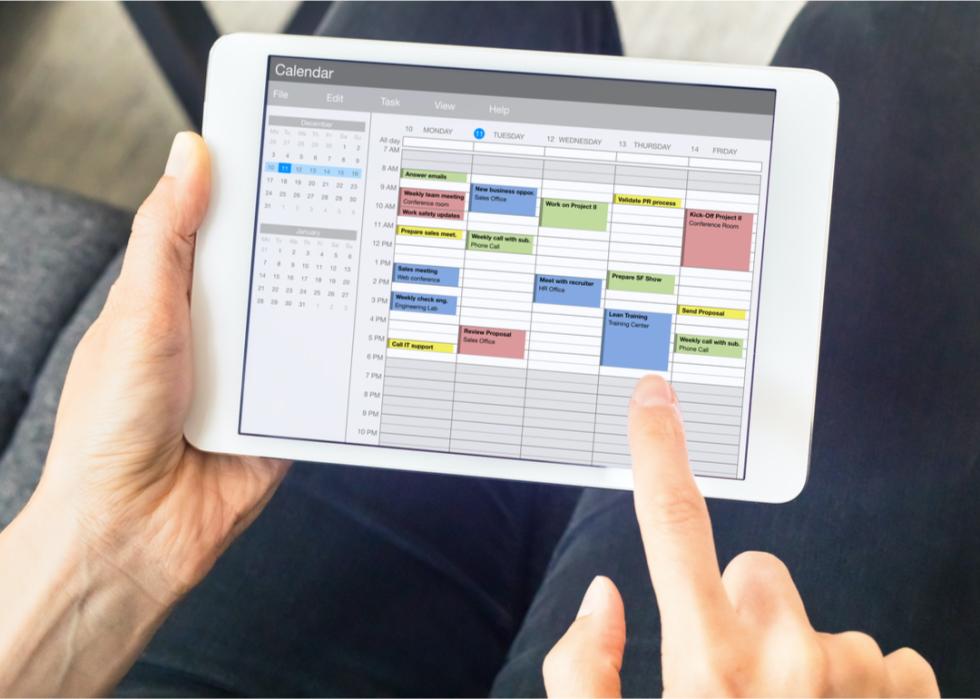
This story originally appeared on Persona Talent and was produced and distributed in partnership with Stacker Studio.
10 productivity game changers for entrepreneurs
There’s an old saying that goes, “Love what you do and you’ll never work another day in your life.” While a nice idea in theory, if you’re an entrepreneur, you know this isn’t entirely true. Running a business, being your own boss, and offering a product or service you’re passionate about is a dream job for many, but it’s still not without its challenges. There are aspects of being the captain of your own ship that may still feel like work to you—like long, drawn-out meetings, stressful deadlines, and endless piles of paperwork.
However, with the conveniences of technology and examples of those who have paved the way, there are many opportunities to overcome these challenges and create an environment that both you and your team can be proud of each day.
Citing advice from well-known executives and other online sources, Persona Talent compiled a list of ways entrepreneurs can encourage productivity for themselves and their company at large.
Here’s what they had to say about how to run a business more efficiently, how to avoid distractions that will keep you from meeting deadlines, and how to prioritize projects that all seem equally important.

Automate tasks
Automation is the way of the future—and the numbers show why. According to WorkMarket’s 2020 In(Sight) Report, more than 50% of employees believe automation could save them 240 hours a year. However, it can be hard to discern which tasks should be automated and which deserve a more personal approach.
While things like managing employees, working with clients, and networking may require time, automating back-end tasks such as bookkeeping and metrics may actually improve business. For example, 40% of business owners reported spending more than 80 hours annually on tax and accounting tasks, with most of them spending more than 41 hours a year. Using software to help track invoices, sending out payment reminders, and automatically paying bills can save a lot of time and may even help avoid accounting errors.

Schedule individual and group check-ins
A healthy work environment is important not only in terms of morale, but also for the bottom line. Employees who feel connected at their jobs tend to be more passionate about their work, according to a Gallup study on employee engagement in 2021. On the other hand, those who don’t feel engaged may not be interested in staying with the organization long term and may be unhappy in their work.
By engaging with and keeping an open communication channel with employees to check in on projects, challenges, and triumphs, you may create a more productive work environment with less turnover.

Keep meeting sizes small
The more people and opinions you have stuffed into a meeting, the longer and less productive they can be. With a smaller group of people and a mindful moderator keeping everyone on track, you can cut down on drawn-out meetings with unproductive outcomes. Having an established agenda and goals before meetings as well as ending meetings with clear next steps can also help to keep meetings to the point and projects moving efficiently.

Consider keeping one work day meeting-free
While meetings can be important opportunities for you and your team to connect and strategize, they can also take up a good chunk of time. According to Statista, 60% of employees find meetings distracting to their productivity. Many employees spend several hours a week in meetings, while those in management can spend even more. This can leave little time to accomplish the tasks established in meetings. Freeing up one day a week to focus on crossing off items on to-do lists instead of creating more can lend itself to being a much more constructive week.

Structure to-do lists in calendar form
To-do lists can be daunting, but they can feel less so if organized well. Breaking down your to-do list as a calendar can make it feel more surmountable visually and mentally. By approaching it this way, you can also have a clear outlook of deadlines and when you need to accomplish tasks as well as subtasks in order to complete a project.
Structuring your duties into a calendar can also help you and your staff better communicate expectations and get on the same page regarding work timelines. It may also help to not overburden yourself with extra tasks that, at the end of the day, you really don’t have time for because you’ll have much easier access to your due dates.

Stop multitasking
While balancing several to-do items at once may seem like a good idea, multitasking can actually stress you out and decrease productivity. According to a 2019 study published in the U.S. National Library of Medicine National Institutes of Health, the idea of multitasking is a bit inaccurate, “as the human mind and brain lack the architecture to perform two or more tasks simultaneously.”
Trying to get your brain to work in a way it was not meant to can be counterproductive and lead to burnout. Instead, focus on doing one task at a time and doing a quality job before moving on to the next project.

Prioritize projects based on urgency
It can be difficult to discern how to prioritize tasks, but one approach is to base decisions on urgency. To analyze which projects warrant the most urgency, ask questions for more details. Will this project impact a relationship with a client if it isn’t met? Will missing the deadline on a project impede your ability to work on other projects or keep an important aspect of your business from functioning? By shedding light on inquiries such as these, you may gain more clarity on next steps or whether existing priorities need to be changed.

Try distraction-free software
Staying on task can be a challenge, especially when technology makes access to diversions so easy to access. For example, nearly 60% of employees find social media to be a distraction at work, according to Statistica. By installing distraction-free software on your work computer and devices, you may be able to avoid interruptions like social media, online games, or news websites. This may help you to more easily establish productive daily habits and check off items on your to-do list at a faster rate.

Develop habits for completing daily tasks
Establishing a well-oiled daily routine can help maintain productivity and avoid distractions. While it can take time before a task forms into a habit, there are plenty of studies that demonstrate how established patterns can be influential. Having a daily routine can help you be productive and check off to-do lists even when you’re not feeling motivated. When planning out and practicing habits, schedule breaks in your routine, including physical exercise if your job keeps you stationary for most of the workday.

Don’t forget to take breaks
Powering through and skipping breaks might sound like a good way to accomplish more during the workday, but it can have the opposite effect. According to the American Psychological Association, studies demonstrate how avoiding breaks during the workday can actually inhibit a person’s performance.
Breaking up the day by taking walks, stretching, or cooking lunch can help combat fatigue and feel more refreshed when you return to your desk. Taking various pauses throughout the day may also help to combat burnout among employees and may lead to higher job satisfaction as a result.



